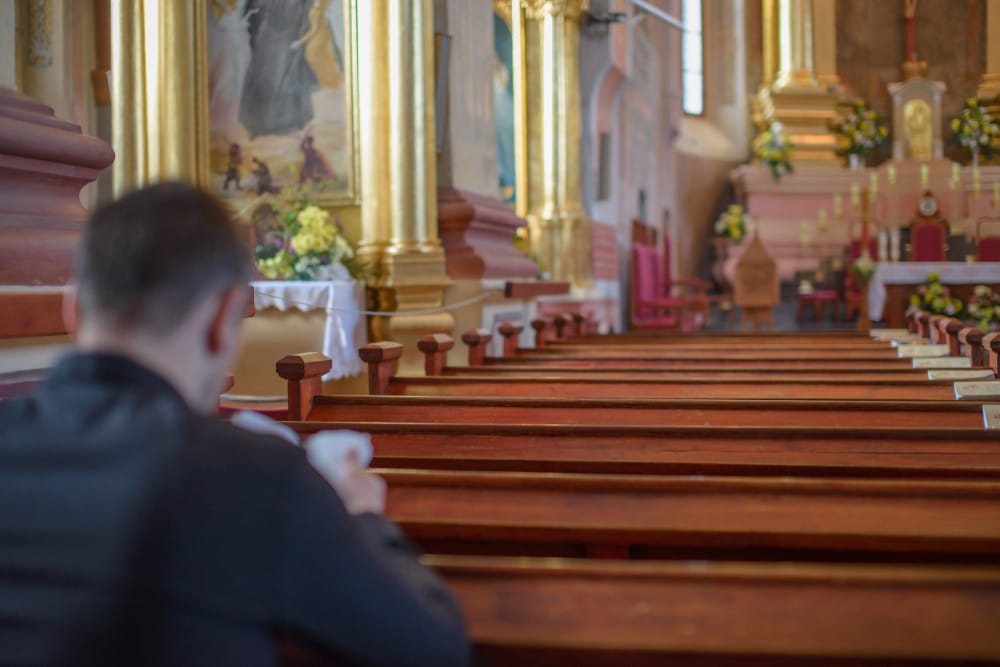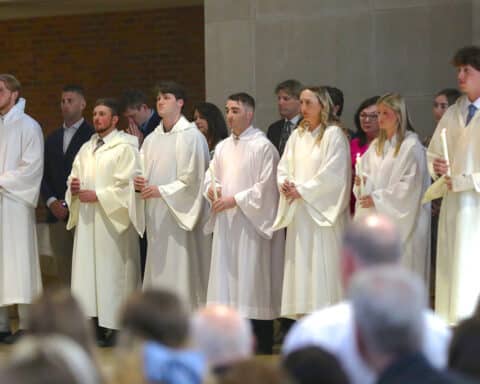The friend, like many friends in the Protestant world I left two decades ago, felt strongly attracted to the Church and its distinctive doctrines, but also strongly dis-attracted by the way he saw them carried out in Catholic life. He believed them to be true, but so objected to the way he saw them expressed that he wondered if they could be true after all. As he put it, they acted “as checks on my attraction.”
This happens a lot. People love the Catholicism they find in books, but not the Church as they find it down the street. And not, as you might think, because Catholics do what they shouldn’t, but because they do what they should.
Our Protestant friends aren’t wrong. The way people act out a teaching gives some clues to its truth. You shall know them by their fruits. But, and this is the tricky part, only if you can recognize the fruits. And in cases like this, they can’t. Some fruits you can only judge by experiencing them yourself.
Eucharistic adoration bothered my friend, but he admitted that feeling called into question how much he really believed the Catholic dogma of the Real Presence, which he held, or thought he held. The bigger issue was, as it so often is, Mary.
“I am not bothered by Marian devotion per se nor by the Marian dogmas, but by the degree of attention and time given to such devotions,” he told me. He understood what he called “the beauty of the Rosary,” but didn’t see the point of saying it so often and thought that when we did say it, we should repeat Scripture verses rather than the Hail Mary.
That I understood. When I entered the Church, I didn’t get the Rosary, or other Marian devotions. I felt a visceral discomfort with Mary being so often present and so big a deal. Mary was the handmaid of the Lord, not the Lord himself.
I had been a bad Protestant, but enough of a Protestant to feel uncomfortable with Marian piety, not only as I saw it in the pious people of our parish, but as I saw it in men like Pope John Paul II. It just felt wrong. She shouldn’t take up so much room in the Church’s life. And that feeling lasted a few years into my Catholic life. The dogmas I quite liked, especially the Assumption, but the piety, no.
As I see it now, I didn’t actually know Mary enough to know how much room she should take up. I hadn’t done enough to know. I’d met her in the formal way people met the queen, but didn’t know her in the personal way you know your mother.
I couldn’t understand her only through observation and analysis. I had to pray a lot of Hail Marys and celebrate her feasts and read a lot of devotions to begin to understand why she was such a big deal. And I still haven’t figured out how to explain it to someone who hasn’t had the same experiences.
That’s the problem in trying to answer people like my friend. You can’t really explain the place of Mary in the Catholic life to those who haven’t seen and felt it. When we turn from matters of doctrine to matters of the actual shape of the Catholic life — to the way those doctrines are expressed in the way people live — arguments become harder to make. The experience can be described, but descriptions always fall short of the experience.
Think of literary descriptions of being a mother or a father as if you were reading them without having a child. You learn something, especially if you read a lot, but you don’t see the whole complicated thing as mothers and fathers experience it. When we were young parents, a lot of conversations with other parents included “I never knew” and “No one told me” and “I never imagined.” You would be wrong to make a final judgment on what it’s like to be a parent from books.
My friend wasn’t wrong to feel the way he did. The way people act out a teaching gives at least some clues to its truth. You shall know them by their fruits. But only if you can recognize the fruits.
You object to a practice you can’t truly judge, I told my friend, but it depends upon a doctrine you can. If the teaching is true, its expression will be basically true, adjusting for the realities of life in a fallen world, and true in a way all the alternatives are not.
This sounds, I know, like a salesman saying “trust me” while trying to sell you a locked box that will cost you all the money you have. The Church is saying that you don’t like this now, but you will, pinky double swear, if you only change your whole life.
Which in this case is a reasonable thing to say. The question for you isn’t what’s in the box, but whether you trust the salesman. Depending on your judgment of the Church and her dogmas, it may be a trust wisely placed.
David Mills writes from Pennsylvania.





